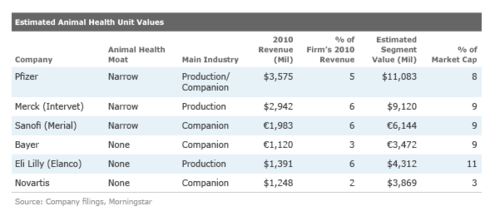Difference between revisions of "Veterinary medicine"
(ownership) |
m (Psychiatric drugs) |
||
| (One intermediate revision by the same user not shown) | |||
| Line 9: | Line 9: | ||
==A Cash Cow for Big Pharma== | ==A Cash Cow for Big Pharma== | ||
[[image:Animal Health market.png|thumb|500px]] | [[image:Animal Health market.png|thumb|500px]] | ||
| − | The global veterinary medicine market size was estimated at USD 29.4 billion in [[2021]] and is expected to grow at a compound annual growth rate (CAGR) of 7.3% from [[2022]] to [[2030]].<ref>https://www.grandviewresearch.com/industry-analysis/veterinary-medicine-market</ref> Six [[Big Pharma]] corporations - [[Pfizer]],[[Merck]],[[Sanofi]],[[Bayer]], [[Eli | + | The global veterinary medicine market size was estimated at USD 29.4 billion in [[2021]] and is expected to grow at a compound annual growth rate (CAGR) of 7.3% from [[2022]] to [[2030]].<ref>https://www.grandviewresearch.com/industry-analysis/veterinary-medicine-market</ref> Six [[Big Pharma]] corporations - [[Pfizer]],[[Merck]],[[Sanofi]],[[Bayer]], [[Eli Lilly]] and [[Novartis]] - control around 64% of the global animal health market. For them, animal health is a better and steadier source of revenue. Animal drugs take far less time, and cost far less, to develop and get to market. The approval for new animal drugs is far easier, as opposed to getting drugs approved for people. Firms also face much less pricing pressure.<ref>https://www.morningstar.com/articles/391588/pfizers-animal-health-unit-is-best-in-show</ref> |
| − | |||
| + | ==Psychiatric drugs== | ||
| + | According to a 2008 report in the [[New York Times]]" The practice of prescribing medications designed for humans to animals has grown substantially over the past decade and a half, and pharmaceutical companies have recently begun experimenting with a more direct strategy: marketing behavior-modification and ‘lifestyle’ drugs specifically for pets"<ref>https://www.veterinarypracticenews.com/is-the-over-reliance-on-psychotropic-drugs-affecting-veterinary-medicine/</ref><ref>http://www.nytimes.com/2008/07/13/magazine/13pets-t.html?em%22&_r=1&</ref> Studies funded by [[Big Pharma]] have suggested antidepressants may help dogs suffering from separation anxiety or compulsive behaviors such as tail chasing.<ref>https://www.ncbi.nlm.nih.gov/pubmed/19751167</ref><ref>https://www.ncbi.nlm.nih.gov/pubmed/17447222</ref> | ||
{{SMWDocs}} | {{SMWDocs}} | ||
==References== | ==References== | ||
{{reflist}} | {{reflist}} | ||
Latest revision as of 07:21, 26 June 2022
(medical concept, Big Pharma) | |
|---|---|
| The branch of medicine that deals with the prevention, control, diagnosis, and treatment of disease, disorder, and injury in animals. |
Veterinary medicine is the branch of medicine that deals with the prevention, control, diagnosis, and treatment of disease, disorder, and injury in animals. Along with this, it deals with animal rearing, husbandry, breeding, research on nutrition, and product development. The scope of veterinary medicine is wide, covering all animal species, both domesticated and wild, with a wide range of conditions that can affect different species.
A Cash Cow for Big Pharma
The global veterinary medicine market size was estimated at USD 29.4 billion in 2021 and is expected to grow at a compound annual growth rate (CAGR) of 7.3% from 2022 to 2030.[1] Six Big Pharma corporations - Pfizer,Merck,Sanofi,Bayer, Eli Lilly and Novartis - control around 64% of the global animal health market. For them, animal health is a better and steadier source of revenue. Animal drugs take far less time, and cost far less, to develop and get to market. The approval for new animal drugs is far easier, as opposed to getting drugs approved for people. Firms also face much less pricing pressure.[2]
Psychiatric drugs
According to a 2008 report in the New York Times" The practice of prescribing medications designed for humans to animals has grown substantially over the past decade and a half, and pharmaceutical companies have recently begun experimenting with a more direct strategy: marketing behavior-modification and ‘lifestyle’ drugs specifically for pets"[3][4] Studies funded by Big Pharma have suggested antidepressants may help dogs suffering from separation anxiety or compulsive behaviors such as tail chasing.[5][6]
References
- ↑ https://www.grandviewresearch.com/industry-analysis/veterinary-medicine-market
- ↑ https://www.morningstar.com/articles/391588/pfizers-animal-health-unit-is-best-in-show
- ↑ https://www.veterinarypracticenews.com/is-the-over-reliance-on-psychotropic-drugs-affecting-veterinary-medicine/
- ↑ http://www.nytimes.com/2008/07/13/magazine/13pets-t.html?em%22&_r=1&
- ↑ https://www.ncbi.nlm.nih.gov/pubmed/19751167
- ↑ https://www.ncbi.nlm.nih.gov/pubmed/17447222
